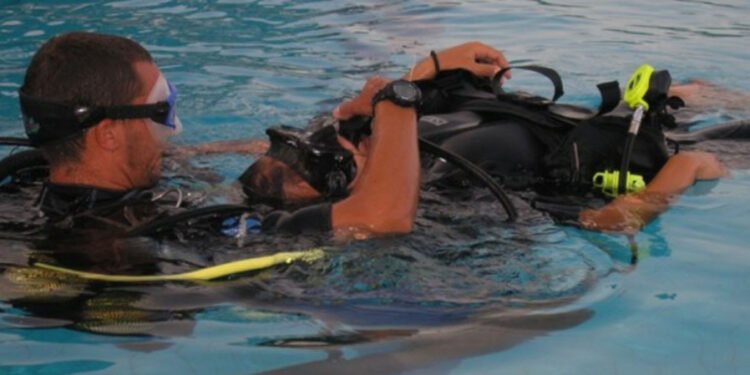Diving is an exhilarating activity, whether pursued recreationally or professionally. However, it comes with inherent risks, including decompression sickness, lung overexpansion injuries, and other medical emergencies unique to underwater environments. For commercial and technical divers, the ability to respond effectively to these emergencies is vital. This is where diver medic training comes in.
This blog will explore the importance of diver medic training, who should consider it, the skills you’ll acquire, and how to start your journey into this specialized and life-saving field.
What Is Diver Medic Training?
Diver medic training equips individuals with the knowledge and skills to provide medical care to divers during emergencies. It focuses on recognizing, diagnosing, and managing medical issues specific to diving, often in remote locations where immediate professional medical assistance isn’t available.
This training is critical for:
- Commercial and saturation divers.
- Diving supervisors and managers.
- Dive medical technicians (DMTs).
- Anyone responsible for diver safety in challenging environments.
Diver medic training typically includes theoretical lessons and hands-on practical exercises to ensure proficiency in life-saving techniques.
Why Is Diver Medic Training Critical?
1.Unique Diving Hazards
The underwater environment poses unique risks that require specialized knowledge to address. Divers can encounter conditions like:
- Decompression sickness: Caused by nitrogen bubbles forming in the bloodstream.
- Barotrauma: Resulting from changes in pressure.
- Hypothermia: Due to prolonged exposure to cold water.
- Near-drowning: From unexpected emergencies.
A diver medic is trained to handle these situations effectively, often making life-or-death decisions.
2.Remote Work Locations
Many commercial diving operations take place in remote areas, such as offshore oil rigs, underwater construction sites, or deep-sea exploration vessels. Immediate access to advanced medical care is not always possible. Diver medics act as the first responders in these situations, bridging the gap until professional medical help arrives.
3.Compliance and Safety Regulations
Organizations involved in diving operations must meet stringent safety standards. Having personnel trained in diver medic practices ensures compliance with regulations from bodies like the International Marine Contractors Association (IMCA) or Divers Alert Network (DAN). This enhances overall safety and minimizes liability.
4.Increased Employability
For professional divers, adding diver medic training to your qualifications can make you a more valuable asset. Many employers prioritize candidates who possess advanced safety and medical certifications.
Skills Acquired in Diver Medic Training
Diver medic training provides an extensive skill set, preparing individuals to address diving-related injuries and other medical emergencies. Key competencies include:
1.Basic Life Support (BLS) and Advanced Life Support (ALS)
Participants learn CPR, airway management, and the use of defibrillators to stabilize patients until further medical assistance is available.
2.Decompression Sickness Management
Training includes identifying symptoms, administering oxygen therapy, and preparing patients for recompression treatments.
3.Hyperbaric Chamber Operations
Many diver medic courses include training in hyperbaric chamber operations, essential for treating decompression sickness effectively.
4.Trauma and Injury Care
The course covers wound care, fracture management, and spinal injury protocols, which are crucial in diving-related accidents.
5.Remote Medical Practices
Participants learn to provide medical care in isolated locations, including administering intravenous fluids, suturing wounds, and managing infections.
6.Psychological Support
Diving emergencies can be traumatic for victims and their peers. Diver medics are trained to provide emotional support and manage stress during high-pressure situations.
Who Should Consider Diver Medic Training?
While diver medic training is essential for professional divers, it’s also valuable for anyone involved in diving operations or working in underwater environments. Potential candidates include:
- Commercial Divers: Enhance your safety knowledge and increase employability.
- Dive Supervisors: Ensure the safety of teams during operations.
- Marine Scientists: Support research missions in remote or hazardous locations.
- Rescue Divers: Strengthen your ability to handle emergencies.
- Military Personnel: Operate more effectively in underwater missions.
How to Start Your Diver Medic Training
1.Research Accredited Programs
When selecting a training program, ensure it is accredited by recognized organizations like the International Marine Contractors Association (IMCA), Divers Alert Network (DAN), or a similar body. Accreditation ensures that the training meets industry standards.
2.Check Prerequisites
Some programs require prior certifications, such as:
- CPR and First Aid certification.
- Advanced Diver Certification (e.g., PADI Rescue Diver or equivalent).
- Relevant work experience in commercial diving or related fields.
Make sure you meet the entry requirements before enrolling.
3.Select the Right Course
Diver medic training courses can vary in duration and scope. Some common options include:
- Basic Diver Medic Course: Covers essential skills for entry-level participants.
- Advanced Diver Medic Course: Ideal for experienced divers or medical professionals seeking to deepen their knowledge.
- Hyperbaric Training: Focuses on operating hyperbaric chambers and treating decompression sickness.
4.Consider Online and In-Person Options
While many programs require hands-on training, some offer blended options combining online theory with in-person practicals. This flexibility allows you to complete parts of the course at your own pace.
5.Attend Hands-On Training
Practical sessions are a crucial component of diver medic training. These sessions often include simulations of real-world emergencies, allowing participants to apply their knowledge under realistic conditions.
6.Obtain Certification
Upon successfully completing the course, you’ll receive a certification recognized by the diving industry. Keep your certification updated through periodic refresher courses, as required by accrediting organizations.
Top Diver Medic Training Providers
Several organizations offer comprehensive diver medic training programs. Consider these reputable providers:
- Divers Alert Network (DAN): Offers globally recognized diver medic training courses.
- International Marine Contractors Association (IMCA): Focused on commercial diving safety.
- National Association of Underwater Instructors (NAUI): Provides training tailored to recreational and technical divers.
Cost and Duration of Diver Medic Training
The cost of diver medic training can range from $1,000 to $3,000, depending on the program and location. Courses typically last 1 to 3 weeks, with additional time required for advanced certifications.
Tips for Success in Diver Medic Training
- Stay Physically Fit: Diving and medic training can be physically demanding. Maintain good physical health to excel in your role.
- Be Prepared for Challenging Scenarios: Simulations can be intense, but they prepare you for real emergencies.
- Stay Up to Date: Regularly refresh your skills and stay informed about advancements in diving medicine.
Career Opportunities After Certification
Completing diver medic training opens doors to various career opportunities, such as:
- Commercial Diving Operations: Serve as a medic on offshore rigs or construction sites.
- Research Expeditions: Provide medical support for marine scientists.
- Diving Instruction: Offer safety and medic training for aspiring divers.
- Rescue Operations: Work in search-and-rescue missions as a first responder.
Conclusion
Diver medic training is an invaluable investment for anyone involved in diving operations. Not only does it prepare you to handle emergencies, but it also enhances your employability and helps ensure the safety of your team.
If you’re ready to embark on this life-saving journey, start by researching accredited programs and finding the course that best suits your needs. With dedication and preparation, you’ll gain the skills to make a significant impact in the diving community.
Ready to get started? Look for certified diver medic training providers and take the first step toward becoming a trusted professional in the underwater world!












